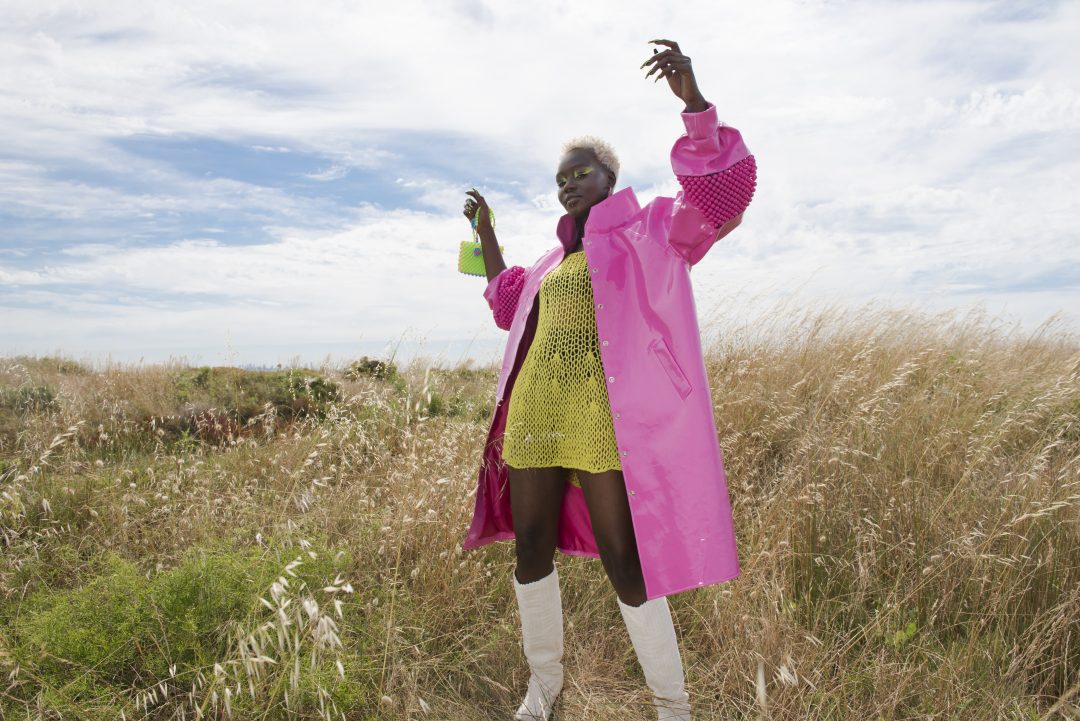Fashion is polarising: fast mega-brands up one end, tiny independants run by impassioned, politically engaged creatives up the other. It’s a good thing. By Janice Breen Burns. (First published The Age/Sydney Morning Herald)
It’s been exhausting sometimes, writing about fashion in recent years. Such a joy once, (the latter bit of last century; oh the glamour!) but revelations of fashion’s ugly underbelly put the kibosh on that. As it should. What a bloody awful industry. So much waste and cruelty.
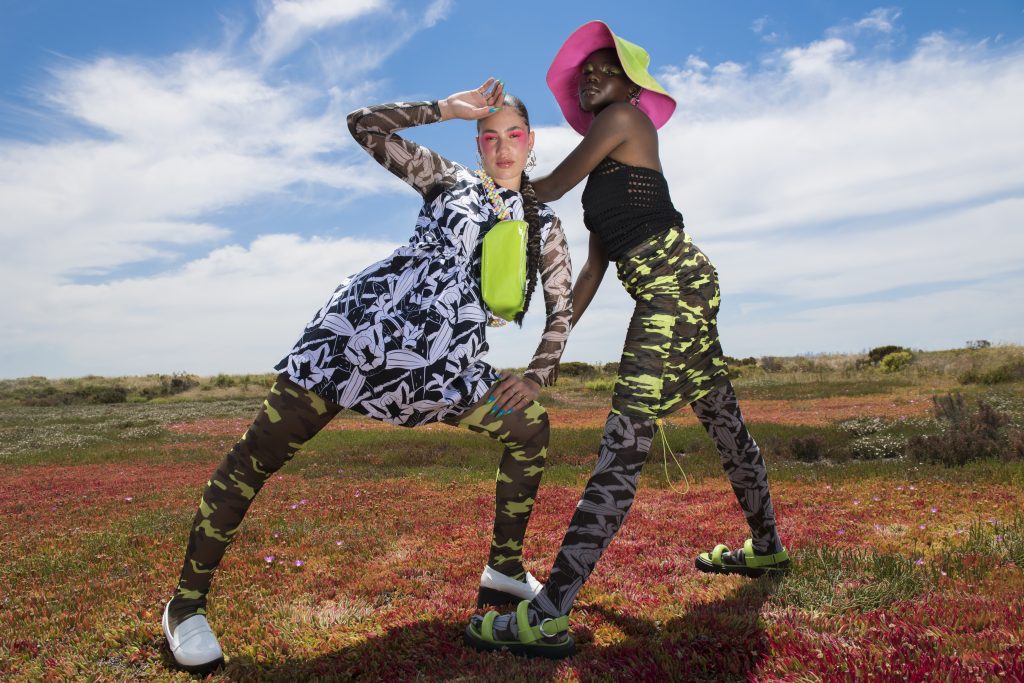
And yet here we are; still needing clothes, still in thrall to those curiously human forces; psycho-micro, socio-macro, tugging us to buy this frock or that shirt or those pants. Who are we is still there in what we wear, our identity expressed in clothes that are cheap, excruciatingly on-trend, pricey and crafted like rare heirlooms, or somewhere in the middle.
Main photo, top: Erik Yvon Laffy Daffy mesh slip and beaded coat.
Model: Ruth Dradi. Photo: Prue Stent. www.erikyvon.com
Last time I checked, fashion was also still pegged at just over 2 per cent of global GDP and providing a living, if barely subsistence for some, middling or mega rich for others, for 450-odd million humans. So the industry is indispensable. It’s also in the process of purging and curing itself. Slowly.
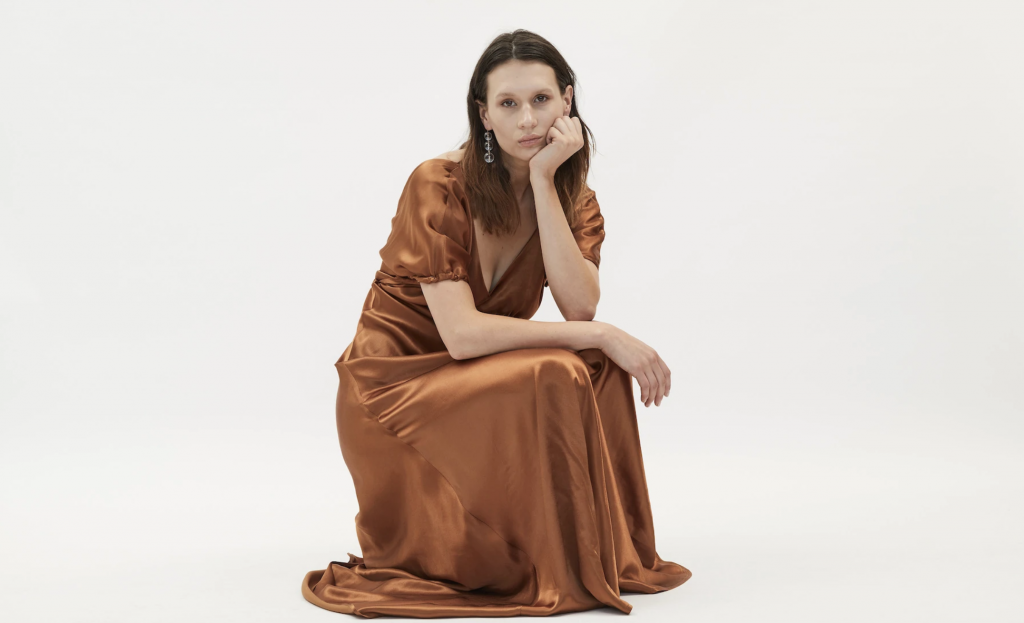
There’s a runway scheduled on the Melbourne Fashion Festival programme (March 3 – 11) loaded with clues to this transition fashion’s in. Independent Runway will show a curated cluster of tinytiny brands run by solo or small creative crews; the antithesis of fashion’s fast and profit-driven big end of town. Many believe, when fastnasty mega-brands are hounded out of fashion, these little wonders – their aesthetics ranging from wacky to quirky classics – will remain. And we will all be better fashion consumers for it.
“They’re amazing,” says Melbourne designer and entrepreneur Kacy Heywood of tiny brand Ka-He. “They’re adventurous, they’re creative, they’ve got strong aesthetics, strong ethics; their labels are almost an extension of themselves.”
Common to all small brands despite their kaleidoscopic disparity of styles, is an over-arching reverence for sustainability and ethical production. Most but not all are also loaded from drawing-board to supply-chain, with weighty narratives and conscience-driven personal politics, links that tend to fuel true intimacy with their like-minded customers. Their tribe.
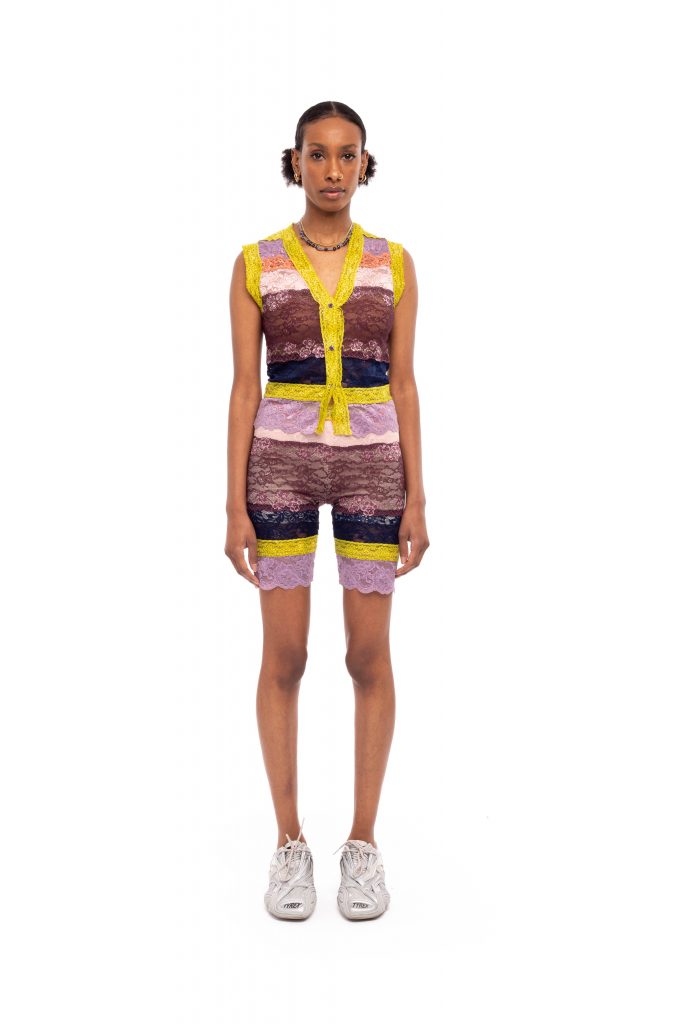
Heywood represents several brands including Erik Yvon, Alix Higgins, Ramp Tramp Tramp Stamp and her own, KAHE, selected for Independent Runway. She established her Fitzroy boutique, Error404 as a platform “to elevate” this tiny genre but also as an outlet to sell and as an intersection where collaborations could fizz up naturally between designers, artists, stylists, photographers, virtually any creative with a yen to plug into fashion’s new world order.
“I started it because there were all these nice kind creative amazingly talented people,” says Heywood of Error404’s genesis. “So many willing to work with each other, but with no idea how to go about it. So now we have this amazing community and all the creativity cross-pollinates…”
Heywood says her cluster of brands blossomed during lockdowns. “That’s one thing Covid did,” she says, “Arts and fashion people didn’t have a job so they took the space to do what they do best; create.”
Their numbers are still swelling as more consumers turn from fashion’s trend-driven herd, splintering into myriad types with myriad personal and political allegiances.
For small-fry brands, now is a perfect storm as increasing numbers of opinionated educated consumers who are also highly engaged on social media, open up to clothes that express their three “P”s: politics, passions and personality.
“You have to have a strong mission statement behind you,” says seasoned small-brand designer Erik Yvon. “People want to know who they’re buying from, what your story is; “Who are you, what’s your backend narrative..?” They want to know who they’re investing in…”
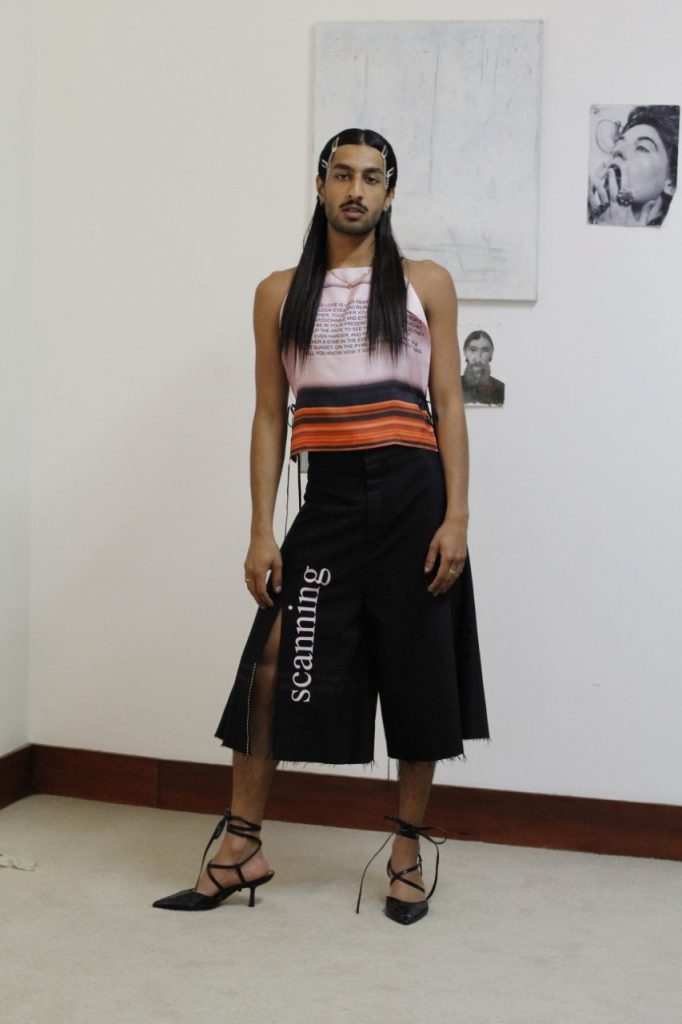
As well as sustainability and ethical practices, most small brands embrace the tenets of woke politics and especially inclusivity. Some more pointedly than others.
“For me it’s all about the queer community,” says Yvon. “I’m really selective about who I work with; who’s supporting the same ethos? I try and engage and interact with other queer makers here as much as possible and to collaborate with others, an illustrator, textile designer, photographers, make-up artists, all kinds of creatives who align with that ethos. Then it creates a little bubble…”
Yvon is a graduate of RMIT and teaches design there now. “The ones starting out are creating their own little bubbles with their own narratives,” he says “They’re about having a group of people like them around so a strong image of their brand evolves and the customer will tap into that.”
Yvon describes his latest collection “Laffy Daffy”, scheduled to show at Independent Runway, as a collaborative effort by members of his own like-minded tribe. “It’s essence is joy,” he says of the collection’s sunshine and lollipops vibe and happy mash of vivid colours and textures. “I wanted joy back in our everyday lives…”
Yvon Laffy Daffy’s core theme and prints on work by Melbourne illustrator Lily Suwitra then collaborated with craftsman Sam Seary on toy-style beadwork and embroidery with artist John Brooks. “I started with Lily’s beautiful florals inspired by her (Indonesian) culture,” says Yvon. “Then I slowly added in other creatives…”
Like most of the tiny brands popping up like daisies across the world, Yvon says he eschews thoughts of global domination for his business and will keep production of his slow-crafted fashion limited and his supply chains short if it means his core mission principles can stay in tact.
“People do think that if you (take production) offshore you lose control,” he says. “But very often the reason is because the skills and machinery just aren’t available here. I get a lot of my hand-knitting done in India for example, but by a beautiful company that is actually upskilling and training women who might be suffering some hardship. I am in contact with them constantly so would know if anything changed.”
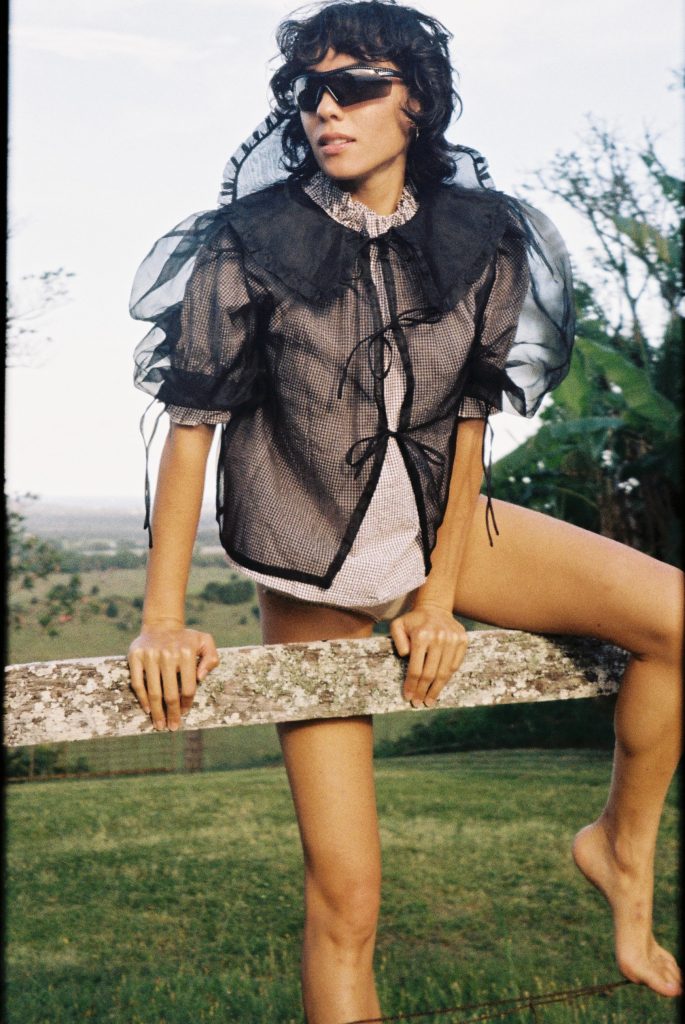
There are tricks to NOT winding up with horrors such as slave labour or cruel practices along your supply chains and they usually involve keeping them as short, transparent and manageable as Yvon’s.
“You can actually do great things if you’re sending off overseas,” agrees Sarah Kourim of tiny Melbourne brand Muse The Label, another one of Independent Runway’s 17 starters. “There are some great artisan projects. But I’ve also seen small labels expand because in the end, it’s all about scale and margins, and lose their values”
Kourim runs Muse The Label with her mum and somehow their different generational perspectives and shared fervour for sustainability (limited editions sewn with dead stock fabrics such as a current textured silk dupon, are numbered by label until the last is cut) exquisitely entwine as their narrative in low-key quirky classics.
“We have a made-to-order (business) model so we’re not over-producing, we’re not wasting, we’ve got personal connections with our customers, we’re happy with the process and it’s the right thing to do,” Kourim says. “Keeping small, being a mother and daughter brand, we find, is a marketing tool in itself because of the way the industry is going. Because of social media though, we may be small but we still have a world wide audience.”
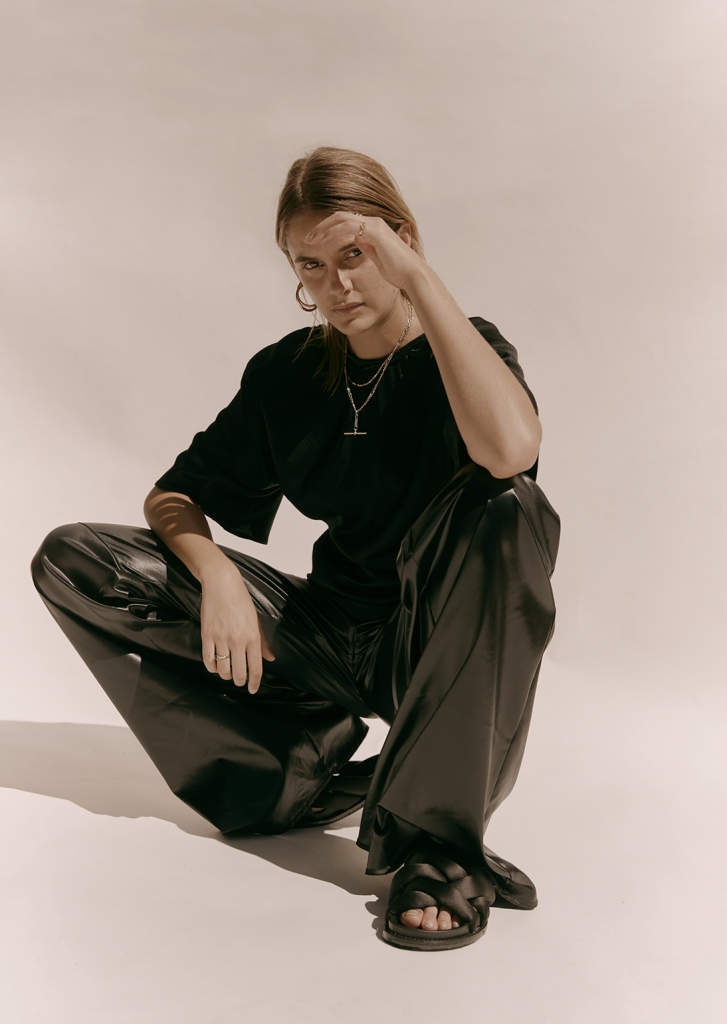
Proof that small definitely doesn’t mean invisible in fashion, Kourim’s social media posts have attracted requests from stylists for the smash-hit pay-TV drama Euphoria and tidy-life pop-guru, Marie Kondo. “We have thought about what we’d do if the opportunity happened to go huge,” Kourim says. “And there’s no need. Anything we did to expand, we’d still keep it local, keep that connection with our market and that limited edition kind of feel.”
It’s a business model even mass production mega-brands around the planet are keen to emulate on some level. Supply chains are being checked, crimes outed, waste controlled, kindness and human rights mingled into mission statements, creative collaborations similar to those among small-brand tribes proliferating. Up the fast fashion end of a paradoxical industry in other words, slowlyslowly the “tanker is turning”. Up the other end, thousands of tinytiny brands is carpeting a new fashion landscape.

